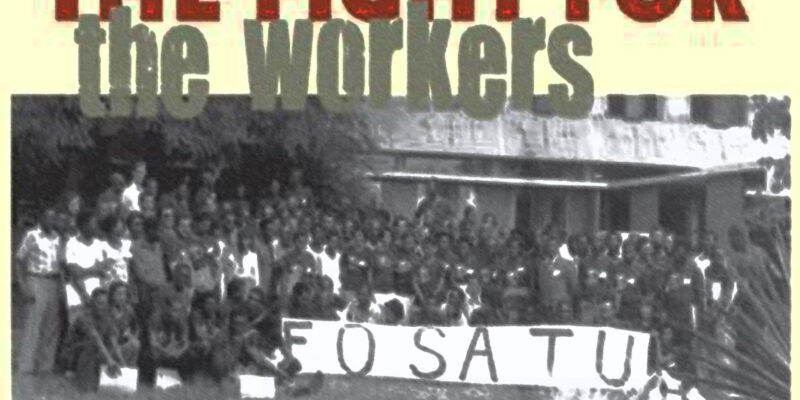Sian Byrne, Nicole Ulrich, Lucien van der Walt. “Red, Black and Gold: FOSATU, South African ‘Workerism’, ‘Syndicalism’ and the Nation”

 Sian Byrne, Nicole Ulrich, and Lucien van der Walt, 2017, “Red, Black and Gold: FOSATU, South African ‘Workerism’, ‘Syndicalism’ and the Nation,” in Edward Webster and Karin Pampillas (eds.), The Unresolved National Question in South Africa: Left Thinking Under Apartheid, Johannesburg: Wits University Press.
Sian Byrne, Nicole Ulrich, and Lucien van der Walt, 2017, “Red, Black and Gold: FOSATU, South African ‘Workerism’, ‘Syndicalism’ and the Nation,” in Edward Webster and Karin Pampillas (eds.), The Unresolved National Question in South Africa: Left Thinking Under Apartheid, Johannesburg: Wits University Press.
The Federation of South African Trade Unions (FOSATU) inaugurated in 1979, the strongest working- class organisation opposing apartheid in the early 1980s. FOSATU was associated with the distinct radical politics of South African ‘workerism.’ ‘Workerism’ has been widely caricatured: this chapter provides a recovery of its politics and history. Its emphasis on strong, industrial, autonomous unions, free of party control, its project of building a working class movement and identity, its participation in a wide range of struggles, and its left-wing, anti-capitalist and class-based (and anti-nationalist) approach to the national question is outlined. For FOSATU ‘workerism,’ ending racism required ending capitalism by a massive redistribution of power and wealth through the extension of ‘workers’ control’ of the workplace, the economy and the larger society; it required a movement separate from the nationalists, including the African National Congress (ANC), the Marxist- Leninists, including the South African Communist Party (SACP), and the multi- class, nationalist popular fronts they promoted.
However, FOSATU was not an anarcho-syndicalist or revolutionary syndicalist union movement, and should not be mispresented as such. It had important weaknesses from which lessons must be drawn. Influenced by a range of ideas (mostly via the New Left, including some elements of anarchism and syndicalism but many others besides), its “quasi-syndicalist” themes jostled with more “social-democratic” approaches. Its limitations were also expressed by its lack of a clear strategy for transition to a new social order, linking its daily practice of organising, educating and mobilising to its long-term vision of ‘workers’ control,’ and by the failure of ‘workerists’ to constitute themselves as an organised revolutionary formation with shared analysis, tactics and strategy within and beyond FOSATU. This opened the door to its defeat by the ANC and SACP. The recovery of the history of FOSATU, and critical reflection on that history, uncovers an important bottom-up politics hidden by nationalist and Marxist-Leninist accounts, yields many valuable experiences and approaches that deserve emulation, but also provides some hard lessons for today’s libertarians.
* Get the complete article here: Byrne, Ulrich, van der Walt – FOSATU, South African ‘Workerism_, ‘Syndicalism_ and the Nation

